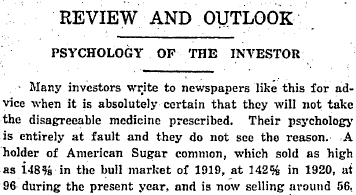October 10-16, 1921
This week, the WSJ examines the psychology of the investor and the business community calls for the passage of the Revenue Act of 1921.
Quick Stats:
DJIA: 70.15 (Today: 34,746)
Shiller PE Ratio: 5.5 (Today: 37.9)
Federal Reserve Bank of NY Discount Rate: 5.0% (Today: 0.25%)
GBPUSD: $3.84 (Today: $1.36)
Price of The Wall Street Journal: $0.07 (Today: $4.00)
Market-Moving Themes:
High taxes, soft business conditions, and elevated interest rates are negatively impacting investor sentiment (equity, debt markets)
Wartime raw material shortages are easing, paving way for price stability (commodity markets)
European post-war debt payments are causing a strong dollar as gold flows to the United States (currency markets)
Executive Summary:
On Monday, the WSJ mentions that many investors have written to them regarding underwater positions from the 1919 bull. Fear, uncertainty, doubt haunt the letters. Rather than provide an easy answer, the editors spend nearly 500 words chastising investors because many can’t explain their purchase of American Sugar (or any common stock) beyond “it was the fashionable thing to buy.” The prospects of these companies haven’t changed, but the emotions of investors have. It recommends everyone hang on if they can stay unemotional because depressed prices afflict all equities today. The editors sardonically acknowledge most readers won’t heed this advice.
Historical Fact: Replace American Sugar with Apple or Tesla, and this entire column could be published during the next bear market. Human psychology hasn’t changed in 100 years. Central banks cannot prevent a bear market once optimism has been exhausted.
Herbert Hoover, the US Commerce Secretary, privately met with Russian officials one month ago and agreed on reduced prices for famine relief. They also devised timetables for Tsarist-era debt repayment. Hoover’s convinced that the Bolsheviks will win the protracted civil war and calls on other nations to help out. A short clip mentions economic output (GDP) has plummeted nearly 90% from 1914! Hoover begins organizing the Russian Famine Relief Act of 1921.
Historical Fact: Lenin tricked American and European officials with the pseudo-capitalist New Economic Policy of 1921 in order to obtain resources. The Soviet Union didn’t embrace capitalism, but rather isolated themselves from the world economy until World War II. And those Tsarist debts? Russia settled them in the 1990s, but not as generously as descendent bond holders had hoped.
Otto Kahn strikes back. He’s one of the most prominent financiers of this period. In Friday’s paper, he schools US politicians on the corrosive nature of high income taxes. Before his tirade begins, he states “a man of his means need have little quarrel with the existing schedules of taxes” because he funnels nearly all his income into tax-exempt bonds. This stifles growth. Money is an instrument for building. Senators must, he emphasizes, lower taxes and vote for the upcoming Revenue Act. More money in people’s pockets means a return to economic growth.
Historical Fact: We’re watching a magic moment play out in economic history. The top marginal tax rate in 1921 was 73%. It’s going to get to 24% by 1929. Both monetary and fiscal policy played powerful roles in driving up risk assets during the Roaring 20s. In 2021, we have a combination of generous taxes - 37% top marginal rate - and near zero percent discount rates.
Several prominent European businessmen fear for Europe’s future as a global center of economic power. According to a multi-part essay, many obstacles stand in Europe's way. The biggest issue: ceding enormous economic privileges to America. Europe must unite and solve lasting issues from the Great War or else risk major upheaval in world order. Worse, the British might even lose out to the dollar as the world’s reserve currency.
Reading this newsletter is free. If you enjoy it, then please share to a friend or donate via PayPal (button below). You may also follow us on Twitter.






